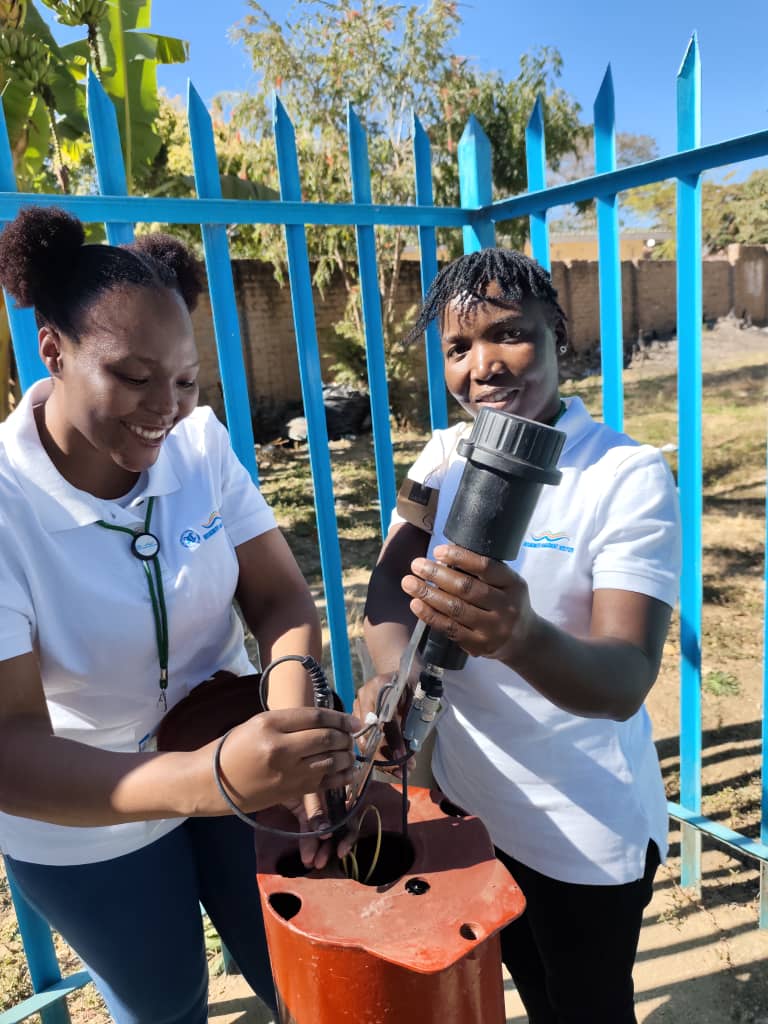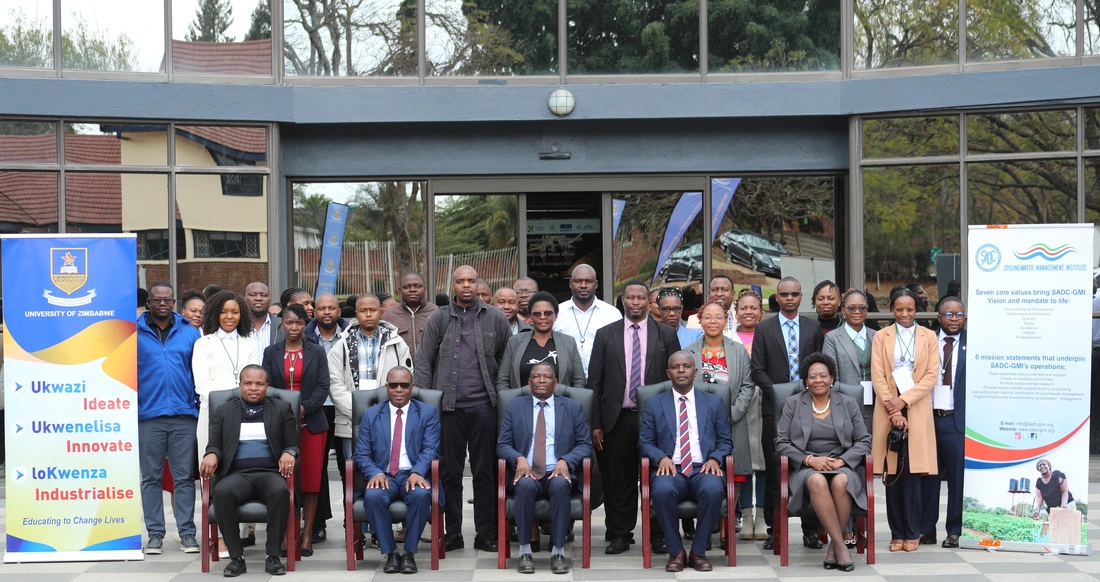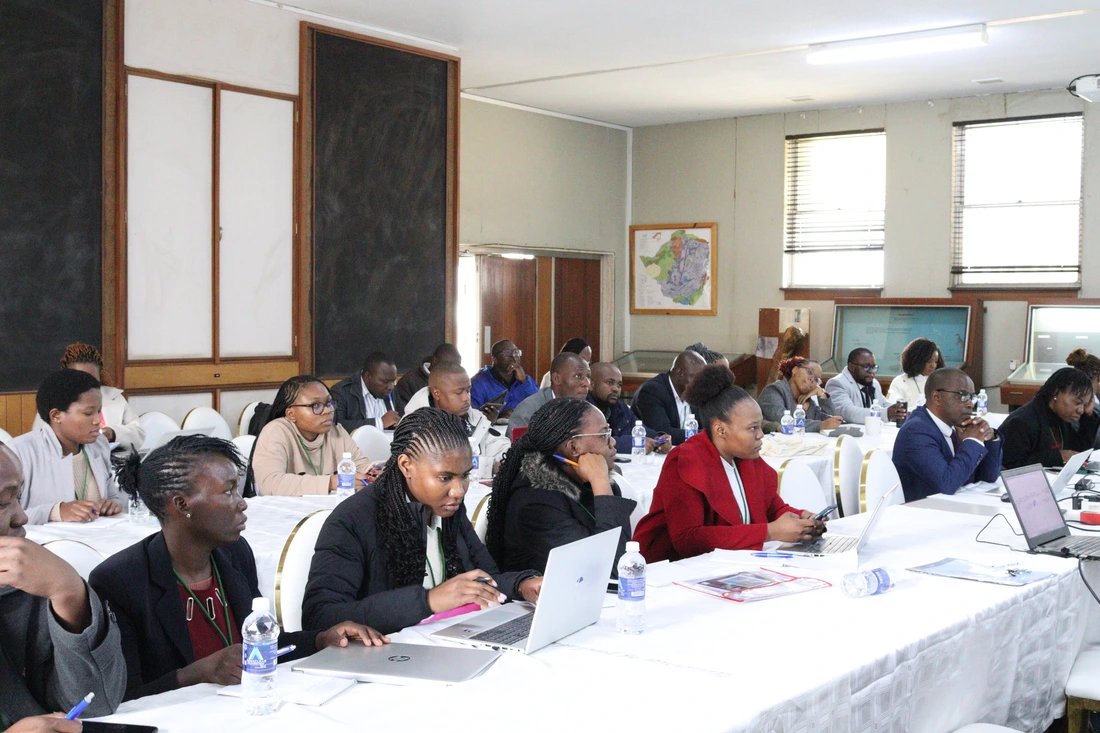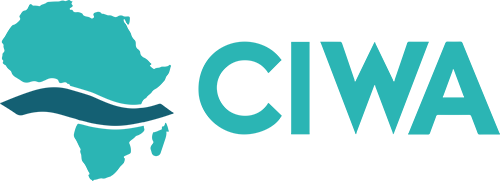Reflections on the SADC-GMI Winter School: Lessons for a Sustainable Groundwater Future
Posted in : Blog on 4 September 2025

From 28th July to 10th August, Gloria Musopole (working now for Baseflow in Malawi), had the privilege of taking part in the Southern African Development Community Groundwater Management Institute’s regional Center of Excellence (SADC-GMI) Winter School. For two intense weeks, she was immersed in a space of knowledge and exchange with lecturers, practitioners, and fellow participants drawn from across the SADC region—Malawi, Zambia, Zimbabwe, Botswana, South Africa, Namibia, Lesotho, and Eswatini. It was challenging, exciting — but above all, it was inspiring.
About SADC-GMI
The Southern African Development Community (SADC) region is subjected to severe climatic variability scenarios which negatively impact more than 70% of the region’s population, who are dependent on groundwater for their livelihoods. Tapping into the region’s groundwater resources can significantly strengthen the region’s water security, improve livelihoods, enhance economic growth, and reduce vulnerability to climate change.
The rationale for the establishment of the SADC-GMI was based on the importance of groundwater in the region and the need to set up a “Centre of Excellence” for groundwater resources and groundwater-dependent ecosystems development and management in the region; and to have an institution that will serve as an interlocutor with national, regional and international groundwater initiatives and institutions.
Water security is pivotal, and water is an indispensable basic need linked to the thriving of every sector in a country’s economy for sustainable and inclusive economic growth. Failure to secure an adequate and reliable water supply to support water-dependent sectors results in the loss or disappearance of jobs. Living up to its mandate, since its inception, SADC-GMI has helped many Member States to tap into groundwater resources to strengthen water security and improve livelihoods for vulnerable communities.
The CIWA program provides financial and technical support to SADC-GMI for projects promoting sustainable groundwater management in the SADC region.
Key aspects of CIWA’s role with SADC-GMI include:
- Funding: CIWA is a primary funder (along with the Global Environment Facility, GEF) of the “Sustainable Groundwater Management in SADC Member States Project” (both Phase 1 and Phase 2).
- Capacity Building: The funding is used to strengthen the institutional and technical capacity of SADC-GMI and its stakeholders in managing groundwater resources.
- Project Implementation: CIWA’s support facilitates the implementation of various groundwater projects at national and transboundary levels, such as the water supply project in Kazungula, Zambia, which improves community access to safe water and sanitation.
- Knowledge Management: The program supports the development and dissemination of knowledge and best practices in sustainable groundwater management.
- Gender and Social Inclusion: CIWA encourages SADC-GMI to focus on diversity in the water sector, promoting the involvement and professional development of women and youth in groundwater-related professions.
In summary, CIWA is a crucial financial and strategic partner that enables SADC-GMI to execute its mandate of promoting sustainable groundwater use to build climate resilience and improve livelihoods in the Southern Africa region.
Here is Gloria story.
Prof. Meck opened my eyes to something we often take for granted: ethics in groundwater governance. In our day-to-day work, ethics can feel like an abstract layer, but in reality, one single decision can ripple across communities and ecosystems. That reminder will stay with me.
Then came Dr. Kevin Pietersen—who joked about being the “oldest young professional” in the room—alongside seasoned voices like Prof. Thokozani Kanyerere. They shared insights on drilling practices, pumping tests, and data interpretation, grounding their lessons in years of hands-on experience. Dr. Webster Gumindoga walked us through software and GIS tools like Google Earth Engine and ILWIS, making what once felt intimidating suddenly approachable. And Eng. Sauramba not only unpacked the complexities of transboundary aquifers but also shared practical wisdom on writing proposals that actually attract funding—something we all know is critical for keeping good ideas alive beyond the classroom.
Groundwater is one of those hidden treasures of our world—out of sight, but never out of mind. It’s practical, complex, and absolutely vital, especially now as climate change tightens its grip and water demands grow sharper. That’s why I believe it’s so important to keep learning, questioning, and connecting with others who share the same passion for protecting this resource.
One session caught me completely off guard. Ms. Anna David introduced isotopes in groundwater studies—a subject I had never really paid much attention to before. Learning how isotopes reveal the “age” of groundwater was like peering into the secret life of aquifers. It was both fascinating and humbling, a reminder that there is still so much to learn about the resource we depend on.
The field trip to the Upper Manyame Sub-catchment was another highlight. Watching colleagues in action—deploying telemetric monitoring devices, collecting water quality samples, and expanding their networks—made the theories come alive. Seeing their determination to strengthen data-driven decision-making reinforced for me that innovation doesn’t always mean reinventing the wheel; sometimes it’s about sharpening the tools we already have.

Looking back, the Winter School was more than just lectures and field visits. It was a platform to learn, to share, and to forge connections that stretch beyond borders. It reminded me that no single country, no single organization, can tackle groundwater challenges alone. Collaboration and continuous learning are not optional—they’re essential.
I am deeply grateful to the SADC-GMI team—Ms. Geetie, Ms. Smangele, Eng. James Sauramba, Ms. Anna David, Ms. Batanayi Gwangwawa, Prof. Maideyi Lydia Mabvira-Meck, and many others working behind the scenes. You created the space for young professionals like me to grow in confidence, deepen our understanding, and view our water resources through a regional lens.

As for me, I return home not only with new knowledge but with renewed purpose. At BASEflow, these lessons will not gather dust. They will shape how we approach borehole rehabilitation, how we train communities, how we strengthen monitoring networks, and how we advocate for policies rooted in ethics and evidence. The Winter School has reminded me that every choice we make—technical, financial, or ethical—can tip the scales toward sustainability. And that’s the kind of impact we owe the communities we serve.
Originally published on the SADC-GMI website here


